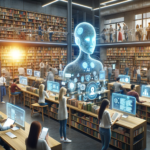
I recently wrote an article about the effects of ChatGPT on libraries and librarians and I wanted to expand on some of the points relating to information seeking and web search.
We are truly at a watershed moment for information literacy that has the potential to be just as revolutionary as when Google first blazed a trail through the internet and supplanted so many traditional sources of information.
Web Search: From Links to Answers (and Where Do They Come From?)
Up until now, the main method of answering our search queries has been turning to a search engine which in turn points to a lists of webpages from which we can cobble together an answer.
We’ve already seen advances in relevance ranking and even snippets which pull some of the websites’ text out for us, but AI and large language models are a completely different ballgame.
It’s the first time that a fully-formed answer to any query can be generated almost instantly, and, crucially, without nearly as clear of an indication as to which parts came from where.
And anyone who cares about credibility, authority, and careful sourcing will certainly have questions about these developments.
The effects of these AI tools will be wide-ranging and will depend on how the technology iterates and how our society reacts to it, but the entire content creation industry is due for a shakeup.
AI Effects on Content Creation Incentives
Some content categories disappearing will be welcome news to searchers, like the bloated articles supplying all the background information no one asked for on a recipe article, a question like “When Does the Super Bowl Start?” or those dreaded Best 10 “X Product” lists.
But will the incentives to create any quality content disappear when the majority of web searchers only read the AI generated answer and forego clicking through to any website?
This could even lead to the failure of AI if there isn’t a sufficient pool of new information on which to train it.
Some have already started to claim that they deserve a royalty for ChatGPT using their information in its answers, and questions over copyright and intellectual property will surely intensify and likely lead to some major court cases.
What gaps will ChatGPT have (for example, if it doesn’t have access the majority of peer-reviewed journal literature that’s locked up in proprietary databases), and what about its potential for helping bad actors to spread misinformation?
The future of online content is up in the air, and its will be interesting to see how things shake out.


Leave a Reply